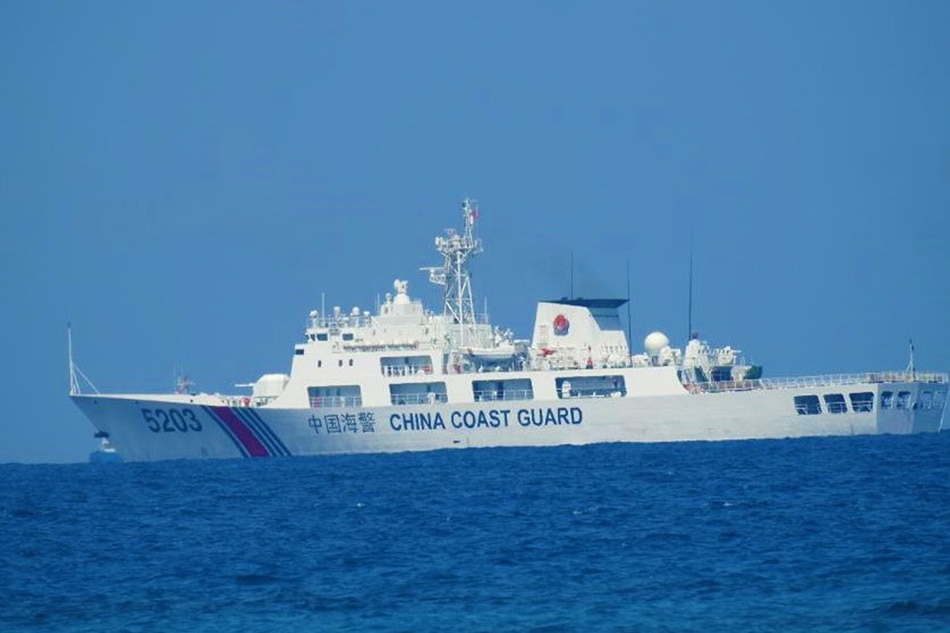Chinese Embassy reiterates position on Coast Guard Law | ABS-CBN

Welcome, Kapamilya! We use cookies to improve your browsing experience. Continuing to use this site means you agree to our use of cookies. Tell me more!
Chinese Embassy reiterates position on Coast Guard Law
Chinese Embassy reiterates position on Coast Guard Law
ABS-CBN News
Published Sep 07, 2021 10:47 PM PHT
MANILA - The Chinese Embassy has reiterated to the media its earlier statement to address concerns over its Coast Guard Law and a maritime measure that reportedly requires foreign vessels to give notice before entering what China claims to be its territorial waters.
MANILA - The Chinese Embassy has reiterated to the media its earlier statement to address concerns over its Coast Guard Law and a maritime measure that reportedly requires foreign vessels to give notice before entering what China claims to be its territorial waters.
The Embassy was being asked to react to a statement made by a United States Coast Guard official who recently expressed concern that this reported law can be a foundation for “instability and potential conflicts.”
The Embassy was being asked to react to a statement made by a United States Coast Guard official who recently expressed concern that this reported law can be a foundation for “instability and potential conflicts.”
China’s new coast guard law, which took effect on Feb. 1 this year, authorizes the Chinese coast guard to fire at other countries' ships that fish or conduct economic activities in waters claimed by China, even if these are “situated beyond the territorial sea, exclusive economic zone, or extended continental shelf of China.”
China’s new coast guard law, which took effect on Feb. 1 this year, authorizes the Chinese coast guard to fire at other countries' ships that fish or conduct economic activities in waters claimed by China, even if these are “situated beyond the territorial sea, exclusive economic zone, or extended continental shelf of China.”
The Chinese Embassy’s statement in February stated that the Coast Guard Law conforms to international conventions and the practices of the international community” and “doesn't specifically target any certain country.”
The Chinese Embassy’s statement in February stated that the Coast Guard Law conforms to international conventions and the practices of the international community” and “doesn't specifically target any certain country.”
ADVERTISEMENT
“China Coast Guard is an administrative law enforcement agency. The formulation of the Coast Guard Law is a normal domestic legislative activity of China. The content of the law conforms to international conventions and the practices of the international community,” China's statement in February read.
“China Coast Guard is an administrative law enforcement agency. The formulation of the Coast Guard Law is a normal domestic legislative activity of China. The content of the law conforms to international conventions and the practices of the international community,” China's statement in February read.
It added that China remained committed to “managing differences with countries including the Philippines through dialogue and consultations and upholding peace and stability in the South China Sea.”
It added that China remained committed to “managing differences with countries including the Philippines through dialogue and consultations and upholding peace and stability in the South China Sea.”
The international Permanent Court of Arbitration invalidated China's sweeping claims over almost the entire South China Sea in a ruling in 2016.
The international Permanent Court of Arbitration invalidated China's sweeping claims over almost the entire South China Sea in a ruling in 2016.
Beijing continues to disregard the ruling as it continued to build islands in the resource-rich waters and has allegedly blocked fishermen from the Philippines and other coastal states from accessing it.
“Enacting such a coast guard law is not unique to China, but a sovereign right to all. Many countries have enacted similar legislation. It is the Philippine Coast Guard Law of 2009 that established the PCG as an armed and uniformed service. None of these laws have been seen as a threat of war."
The Chinese Embassy also pointed out that “[s]ome forces in the Philippines, either for their own political interests or out of prejudice toward China” have “misinterpreted China's normal legislation.”
Beijing continues to disregard the ruling as it continued to build islands in the resource-rich waters and has allegedly blocked fishermen from the Philippines and other coastal states from accessing it.
“Enacting such a coast guard law is not unique to China, but a sovereign right to all. Many countries have enacted similar legislation. It is the Philippine Coast Guard Law of 2009 that established the PCG as an armed and uniformed service. None of these laws have been seen as a threat of war."
The Chinese Embassy also pointed out that “[s]ome forces in the Philippines, either for their own political interests or out of prejudice toward China” have “misinterpreted China's normal legislation.”
The Philippines in January filed a diplomatic protest against China’s new coast guard law, with Foreign Affairs Secretary Teodoro Locsin Jr. saying the law involves the contested South China Sea and is a “verbal threat of war to any country that defies the law.”
The Philippines in January filed a diplomatic protest against China’s new coast guard law, with Foreign Affairs Secretary Teodoro Locsin Jr. saying the law involves the contested South China Sea and is a “verbal threat of war to any country that defies the law.”
Malacañang, meanwhile, had said China's laws must follow obligations under the United Nations Convention on the Law of the Sea, which only allows the use of force in "well-defined exceptions" like self-defense and authorization from the UN Security Council.
Malacañang, meanwhile, had said China's laws must follow obligations under the United Nations Convention on the Law of the Sea, which only allows the use of force in "well-defined exceptions" like self-defense and authorization from the UN Security Council.
- Willard Cheng, ABS-CBN News
WATCH
Read More:
China
US
Coast Guard
South China Sea
United States Coast Guard
China Coast Guard Law
China
China-US
diplomacy
overseas
ADVERTISEMENT
ADVERTISEMENT


